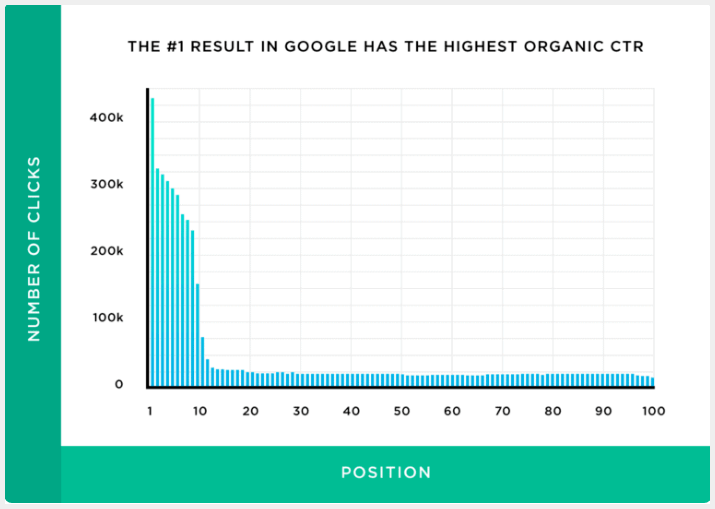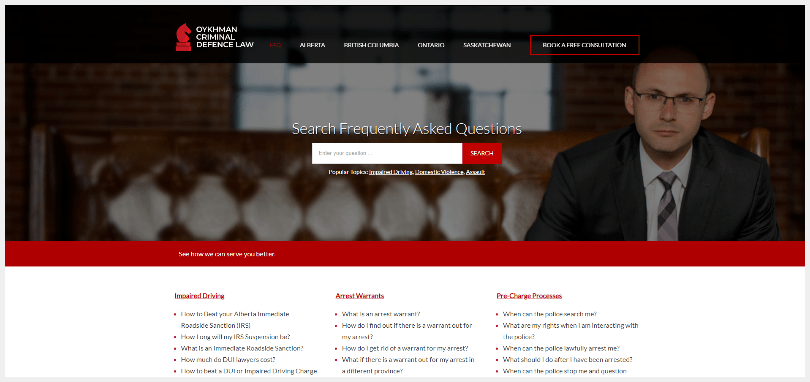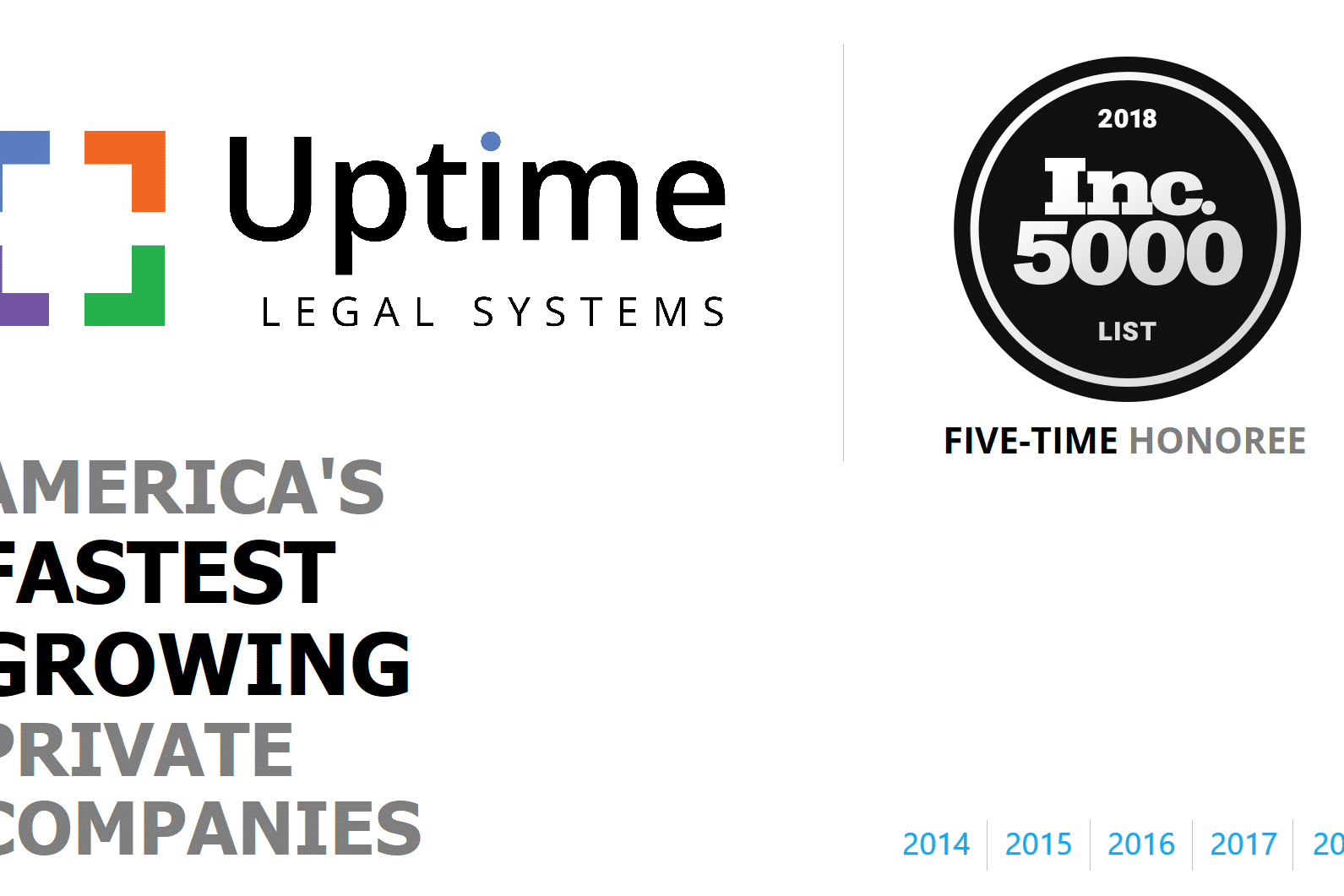Law Firm SEO Tips: 3 Tactics for Increasing Your Rankings
 Did you know that 37% of new clients use Google to find a lawyer?
Did you know that 37% of new clients use Google to find a lawyer?
That’s a lot of leads you could be missing out on.
By investing in law firm search engine optimization (SEO), you can obtain first-page ranking positions on Google. It’s the most cost-effective way to generate leads, with guaranteed compounding returns over time.
In this article, we’ll take a closer look at what SEO is and share some law firm SEO tips to get you started.
Table of Contents
What is lawyer SEO?
To understand why SEO is important for lawyers, we need to talk about the basics.
Search engine optimization (SEO) is the process of driving a higher quality and quantity of traffic to your website from search engines.
SEO helps increase your website’s position on search engines like Google and Bing. And the higher your rank, the more traffic you’ll get.
The number one result in Google gets 31.7% of all clicks. After that, the clickthrough rate (CTR) drops. If you’re on the second page, you may as well not be there at all.

Fortunately, there are many ways to improve your rankings without spending a dime on ads. There’s onsite optimization, link building, content development, and in-depth keyword research — and that’s just the tip of the iceberg.
Lawyer SEO follows the same principles but is tailored to meet the demands of businesses in the legal industry.
3 tips to master law firm SEO
We guarantee you’ll see returns if you focus on these three tips.
1. Do a technical SEO deep dive
We could write a book on the ins and outs of technical SEO. You can create the best content, but without a grasp of technical SEO, it’ll all go to waste.
Put simply, it refers to how “Google-friendly” your website is.
The best law firm websites are fast, easy to navigate, and follow Google’s guidelines. Technical SEO also involves things like security, sitemaps, and crawlability.
For inspiration, take a look at the Burnet, Duckworth & Palmer website.

Many law firms hire a digital marketing agency specializing in law firm SEO to handle this, as it can be challenging to do yourself.
But if you want to take a crack at it, here are a few of the basics:
Your law firm’s website should be fast, secure, and mobile-friendly
The ideal loading speed for your website is between 1-2 seconds. The faster it is, the better.
You should have an SSL certificate, which authenticates your website’s identity and encrypts information sent between the server and the browser.
Lastly, your website should be responsive. Responsive design lets your website render quickly and accurately for all screen sizes, including mobile devices.
Your law firm’s website should be easy to navigate
Make sure your website is easy to navigate for humans and web crawlers.
Keep your menus simple and intuitive, and frequently link back to other important pages on your website.
2. Do your keyword research
Keyword research involves identifying relevant search terms that potential clients are typing into search engines. Finding out what your target audience is looking for can help you create a marketing strategy for your law firm.
You may have heard of head terms and long-tail keywords. Head terms are one to three words long and are broad, like “personal injury lawyer.”
A long-tail keyword is longer and much more specific, like “how to find a personal injury lawyer.”
Both types of keywords should be used in your SEO strategy. But long-tail keywords are less competitive and easier to rank for.

But that’s not the whole story. You also need to think about the user intent behind that keyword. You can do everything else right, but if your web page doesn’t address user intent, it won’t rank well on search engines.
For example, when someone searches “what does a lawyer do,” do they want to know what a lawyer does in court? Or maybe they want to see a day-in-the-life of a lawyer?
To figure it out, you can enter the keyword into Google and see what comes up.
3. Create killer content
After you’ve figured out your keyword strategy, you’ve got to start creating content.
The quickest way to get started is to create a blog. Authoritative, relevant, and optimized blog posts are not only the best way to rank for long-tail keywords, but they’ll also help you get backlinks.
Use your blog to answer informational queries that your clients are searching for. For example, you could write a blog post on “how to find a personal injury lawyer,” which addresses one of the long-tail keywords we want to target.
What’s really important is ensuring that your content answers the searcher’s inquiry. If someone searches for a “personal injury lawyer in Calgary,” the content on your website needs to tell your client (and Google) that that’s exactly what you are.
It should be easy for a searcher to navigate your content and find the answers they’re looking for.
Someone searching for a personal injury lawyer in Calgary will want to know:
- Is this a law firm in Calgary?
- Do they practice personal injury law?
- Are they within my price range?
- Do they have good reviews?
And you aren’t limited to a blog.
Creating different types of content, including videos, blog posts, landing pages, infographics, and even a simple FAQ can propel you to the top of the SERP.
Oykhman Criminal Defence has created an excellent FAQ, answering just about any question someone might ask before reaching out for a consultation.

Improve your rankings with law firm SEO
Getting a handle on SEO is just one part of a law firm marketing strategy. But it’s one of the most important.
Set the scene for a successful SEO campaign by mastering technical SEO. Then focus on creating comprehensive and relevant content.
You might not see results in a month, but with consistent effort, your search engine rankings will improve over time.
Related Posts
October 10, 2023
Uptime Legal Named Clio Partner of the Year
September 15, 2022
Uptime Legal Expands Operations to Austin, TX
June 2, 2022
Uptime Legal Acquires Flywire Technology
March 24, 2022
LexWorkplace Enters Full Commercial Release
February 22, 2022
Erin Pickar Named Uptime Legal’s President & COO
September 24, 2020
JurisPage Launches Legal Marketing 360™
September 9, 2020
Uptime Legal Named to Inc. 5000 List for Seventh Consecutive Year
March 16, 2020
Uptime Legal Acquires Inbound Law Marketing
December 10, 2019
2019 Legal Technology – Year in Review
December 11, 2018
2018 Legal Technology – Year in Review
November 14, 2018
Announcing LawLauncher 2018
November 14, 2018
Uptime JurisPage Wins 2018 Web Award
February 21, 2018
Uptime Legal Unveils Next Generation of Private Cloud for Law Firms
December 20, 2017
2017 Legal Technology – Year in Review
November 9, 2017
Uptime Legal to Host Virtual Summit for Lawyers
The Law Launcher virtual summit is an…
December 15, 2016
2016 Legal Technology – Year in Review
September 12, 2016
Uptime Legal Releases LegalWorks 2.1
May 18, 2016
TECHdotMN Interview with Uptime Legal CEO
May 3, 2016
Uptime Legal Acquires JurisPage
April 14, 2016
Uptime Legal Releases LegalWorks 2.0
December 17, 2015
2015 Legal Technology – Year in Review
October 19, 2015
Uptime Legal Named a 2015 RCP Rocket Award Winner
August 13, 2015
Uptime Legal Named a 2015 Inc. 5000 Fastest Growing Company
July 22, 2015
Uptime Legal Launches Authorized Partner Program
May 11, 2015
Akron Legal News Recognizes Uptime Legal
February 11, 2015
IP: The Next Evolutionary Step for IT Service Firms
January 2, 2015
Uptime Featured in Finance & Commerce
October 31, 2014
Minnesota Lawyer Features Uptime Legal
August 20, 2014
Uptime Named to Inc. 5000 List of Fastest Growing Companies
June 26, 2014
LawBase Software Partners with Uptime
April 17, 2014
Illinois Lawyer Magazine Recognizes Uptime
March 7, 2014
California Lawyer Magazine Recognizes Uptime
March 3, 2014
Uptime Launches Exchange Legal Edition
November 6, 2013
Uptime CEO Honored as Leading Technology Executive
November 4, 2013
Arizona Attorney Magazine Recognizes Uptime
October 18, 2013
American Bar Association Hails Cloud Computing Recognizes Uptime
August 20, 2013
Uptime Named to CRN’s Next-Gen 250
February 15, 2013
Uptime Recognized as one of the World’s Leading IT Service Providers
January 31, 2013
Uptime Featured as Cloud Success Story by Intermedia
November 9, 2012


























































